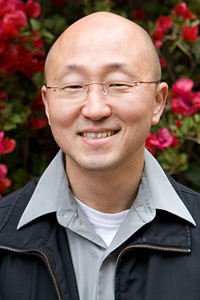Diabetes Treatment Standards for Frail Older Adults Should Be More Flexible
 Sei J. Lee, MD
Sei J. Lee, MDDiabetes treatment standards for frail older adults should be more flexible than those for younger adults, focusing more on day-to-day quality of life and less on long-term results, according to a geriatrician at the San Francisco VA Medical Center.
In a Commentary in the April 6, 2011 issue of Journal of the American Medical Association, Sei J. Lee, MD, said treatment plans for frail elders should be based on degree of frailty, life expectancy, and the health outcomes that are most important for each patient.
The long-term goal of diabetes treatment for younger patients is the avoidance of vascular complications – including heart attack, stroke, and kidney disease – that are brought about by chronically high blood glucose, which damages circulation in small blood vessels.
In order to accomplish this goal, patients are trained to monitor blood glucose frequently during the day, and keep the level relatively low through diet, medications, and insulin injections – a regimen known as tight control.
“Although tight control makes sense for most patients, for frail older patients it may come at too high a price, namely hypoglycemia – dangerously low blood sugar – and even hypoglycemic coma,” said Lee. “We should keep in mind that the long-term vascular benefits of tight control are usually not seen in patients for approximately eight years. Since frail older patients face other, more immediate risks to their mortality and are unlikely to survive this long, they are exposed to all of the risks with none of the advantages.”
Lee, who is also an assistant adjunct professor of medicine at the University of California, San Francisco, said that for frail elders, other goals should take precedence, such as decreasing the immediate risks of incontinence, deteriorating cognition, or symptomatic hyperglycemia (high blood sugar). “Since these outcomes can be avoided with less aggressive treatment, these are what we should focus on, with the goal of increasing each elder’s quality of life,” he said.
“More research is needed to determine the correct, evidence-based standards for glycemic control among these patients,” said Lee.
The co-author of the Commentary is Catherine Eng, MD, Clinical Professor of Medicine at UCSF and Medical Director of On Lok Lifeways in San Francisco. Also contributing were Kenneth Covinsky, MD, MPH, of SFVAMC and UCSF and David Aron, MD, of Louis Stokes Cleveland VA and Case Western Reserve University.
Research for the Commentary was supported by funds from the Hartford Geriatric Health Outcomes Research Scholars Award, the Hellman Family Foundation Award for Young Faculty Scholars at UCSF, and the National Institutes of Health. Some of the funds were administered by the Northern California Institute for Research and Education.
NCIRE - The Veterans Health Research Institute - is the largest research institute associated with a VA medical center. Its mission is to improve the health and well-being of veterans and the general public by supporting a world-class biomedical research program conducted by the UCSF faculty at SFVAMC.
SFVAMC has the largest medical research program in the national VA system, with more than 200 research scientists, all of whom are faculty members at UCSF.
UCSF is a leading university dedicated to promoting health worldwide through advanced biomedical research, graduate-level education in the life sciences and health professions, and excellence in patient care.